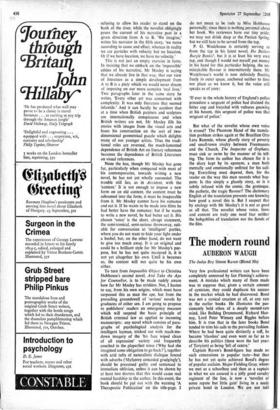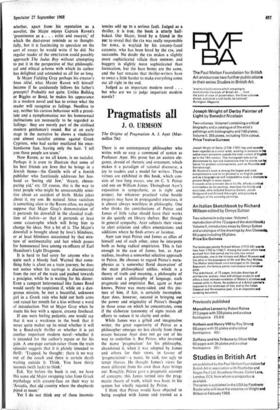The modern round
AUBERON WAUGH
The Judas Boy Simon Raven (Blond 30s)
Very few professional writers can have been completely unmoved by Ian Fleming's achieve- ment. A mistake which many of them made was to suppose that, given a certain amount of cynicism, they could duplicate his success in the market which he had discovered. Bond was not a cynical creation at all, at any rate in the earlier books. He illustrates the pas- sionately held ethos of a deeply second-rate mind, like Bulldog Drummond, Richard Han- nay, Lord Peter Wimsey and Biggles before him. It is true that in the later books Bond tended to trim his sails to the prevailing fashion. Where he had been quite distinctly a toff, he became 'classless' and even went so far as to describe his politics (these were the last years of Toryism) as being 'left of centre.'
Captain Raven's Bond-figure has made no such concessions to popular taste—but then he has not yet quite achieved Bond's degree of popular acclaim. Major Fielding Gray, whom we met as a schoolboy and then as a captain in what we are assured is a jolly good cavalry regiment of the line, is now a 'novelist of some repute but little gain' living in a seedy private hotel in London. We are not told
whether, apart from his reputation as a novelist, the Major enjoys Captain Raven's `prominence as a . . . critic and essayist,' of which the dust-cover reminds us so thought- fully, but it is fascinating to speculate on the sort of essays he would write if he did. No regular reader of the SPECTATOR could possibly approach The Judas Boy without attempting to put it in the perspective of that philosophi- cal and ethical schema with which its author has delighted and astounded us all for so long.
Is Major Fielding Gray perhaps his creator's beau ideal, what Master Raven will himself become if he assiduously follows his father's precepts? Probably not quite. Unlike Bulldog or Big,gles or Bond, he makes his appearance in a modern novel and has to evince what the reader will recognise as failings. Needless to say, neither his curious behaviour with a prosti- tute and a nymphomaniac nor his homosexual inclinations are necessarily to be regarded as failings: they are merely part of the civilised modern gentleman's round. But at an early stage in the narrative he shows a vindictive and almost racialist animus against Greek Cypriots, who had earlier mutilated his once- handsome face, leaving only the hair. 'I tell you those people are scum.'
Now Raven, as we all know, is no racialist. Perhaps it is even to illustrate that some of his best friends are Jews that he brings in a Jewish theme—the Gentile wife of a Jewish publisher who facetiously addresses her hus- band as 'boring old Jew,"dreary, cheese- paring yid,' etc. Of course, this is the way to treat people who might be unreasonably sensi- tive about an accident of birth. Make jokes about it, my son. Be natural. Since racialism is something alien to the Raven ethos, we might suppose that Major Gray's demonstration of it portends his downfall in the classical tradi- tion of hubris—or that it portends at least some catastrophe which will bring him to change his ideas. Not a bit of it. The Major's downfall is brought about by love's blindness, or at least blindness occasioned by that mix- ture of sentimentality and lust which passes for homosexual love among ex-officers of Earl Hamilton's Light Dragoons.
It is hard to feel sorry for anyone who is quite such a bloody fool. Warned that some- thing fishy is afoot on a train journey, he does not notice when his carriage is disconnected from the rest of the train and pushed towards a precipice, while he is waiting for his dinner. Even a rampant heterosexual like James Bond would surely be suspicious if, while on a dan- gerous mission, he met a beautiful, unknown girl in a Greek ruin who held out both arms and raised her mouth for a kiss without a word of introduction. Not so Major Gray when he meets his boy with a square, creamy forehead.
If one were feeling pedantic, one would say that it was a weakness in the book that it never quite makes up its mind whether it will be a Bond-style thriller or whether it is yet another important modern novel—whether it is intended for the author's repute or for his gain. A one-page curtain-raiser (from the train episode) suggests that it is plainly intended to thrill: 'Trapped, he thought: there is no way out of the coach and there is certain death waiting outside it. Think. You have thirty seconds (with luck) to think.'
Eek. Yet before the book is out, we have this same old Major swapping tales from Greek mythology with creamy-face on their way to 'Arcadia, that old country where the shepherds piped at noon.'
Yet I do not think any of these inconsis- tencies add up to a serious fault. Judged as a thriller, it is true, the book is utterly half- baked. Our Major, hired by a friend in the BBC to reveal that the cm was really responsible for EOKA, is waylaid by his creamy-faced catamite, who has been hired by the CIA, and succumbs. No doubt the cu makes a slightly more sophisticated villain than SMERSH, and buggery is slightly more sophisticated than fornication, but the bare bones are the same, and the fact remains that thriller-writers have to sweat a little harder to make everything come out all right in the end.
Judged as an important modern novel . . . but who are we to judge important modern novels?











































 Previous page
Previous page